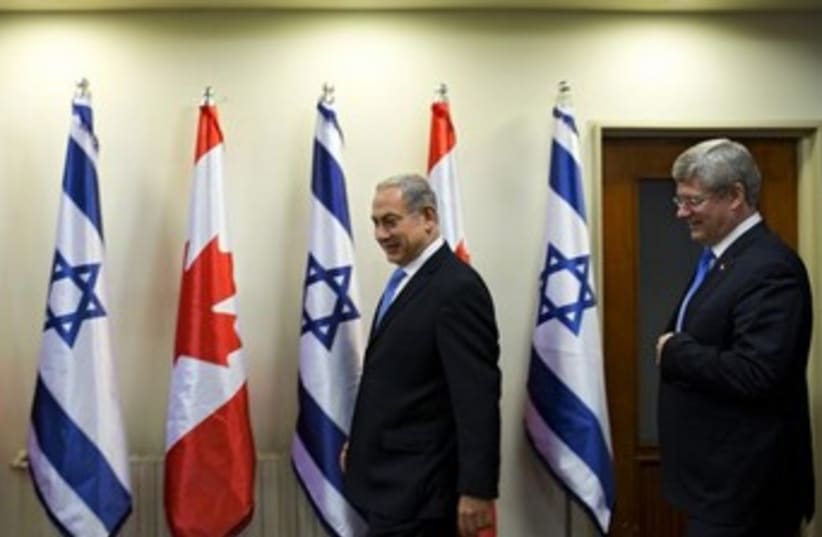There are more than enough voices in the world slamming Israel, and no reason why he should join the chorus, Canadian Prime Minister Stephen Harper said on Tuesday, unapologetic for his unabashed support of the Jewish state.Harper, at a press conference at the Prime Minister’s Office in Jerusalem alongside Prime Minister Binyamin Netanyahu, was asked about Canada’s position on settlements, and responded that he did not come to the region to single Israel out for criticism.Canada’s view on the settlement issue was “publicly available,” he said. Canada, as is written on the country’s Ministry of Foreign Affairs, Trade and Development website, views settlements as a “violation of the Fourth Geneva Convention” and as a “serious obstacle to achieving a comprehensive, just and lasting peace.”But, Harper added, “let me emphasize that I am not here to single out Israel.”He said he found it interesting that when he visited the Palestinian Authority on Monday, “no one asked me there to single out the Palestinian Authority for any criticism in terms of governance or human rights or anything else.”“I’m asked to single out Israel,” he said of the settlements question. “When I’m in Israel I’m asked to single out Israel, when I’m in the Palestinian Authority I’m asked to single out Israel, and half the other places around the world you ask me to single out Israel.”One lesson Canadians have learned is “that when someone is a minority, a particularly small minority in the world, one goes out of ones way to embrace them, not to single them out for criticism,” Harper said.This was “a fundamental Canadian ethic, and that is why I think many Canadians understand the approach I am taking, which does not in any way prevent me from expressing to the government of Israel and the Palestinian Authority the various issues which we disagree, and which our disagreements are quite frankly matters of public record,” The Canadian prime minister said.Netanyahu responded at the press conference to the same question with a lengthy answer saying the refusal of the Palestinians to accept Israel in any parameters was the core of the Israeli-Palestinian conflict, and not the settlements.Canada had a “different position from Israel” on the settlements, and this issue would be worked out in negotiations with the Palestinians, Netanyahu said. “But it is not the core of the conflict. We know that because this conflict raged for half a century before there was a single Israeli settlement or Israeli soldier in Judea, Samaria and Gaza.”Harper, who said there were 25,000 Canadians living in Israel, denied that Canada was paying a heavy price in the Arab world for its close ties to Israel.“I wouldn’t want to say there is no price, but my general view of the world is that people respect your view if you express it appropriately and they understand it is genuine,” he said.Canada has deep relationships with many Arab countries, and is a significant financial contributor to the PA, Harper said.“I don’t think it is automatic that if you have a particular area where you disagree that this needs to rupture relations,” he said.Netanyahu added to Harper’s answer, saying that “there is a new Middle East out there, it’s different.” He said that despite automatic positions always voiced in the Arab world, “if you scratch the surface underneath,” it will be revealed that the greatest concerns facing the Arab countries are not Israel, but rather Iran and the spread of the Muslim Brotherhood.
“In meeting those twin challenges, these countries do not see Israel as their enemy, but as being on the same side of a difficult conflict,” he said.Harper, on his first-ever visit to Israel, said he was particularly struck by “how small all of this space truly is.” This obviously speaks to the security concerns of Israel, and “how truly existential any security threat of any kind really is,” he said.The press conference followed a working meeting between Harper and Netanyahu, after which Foreign Minister Avigdor Liberman and his Canadian counterpart, John Baird, signed a Canada- Israel Strategic Partnership Memorandum of Understanding that “reaffirms the close and special friendship.”Under the MOU, the states committed themselves to “redouble efforts to advance common interests with a particular focus on promoting jobs, growth and economic prosperity in both countries.”The two leaders announced the launch of negotiations to expand and update the Canada- Israel Free Trade Agreement.In 2012, bilateral merchandise trade between Canada and Israel was valued at $1.41 billion.Following the press conference, Netanyahu accompanied Harper to Yad Vashem.The Canadian premier also toured the capital’s Old City, and in the evening was hosted for a state dinner attended by some 400 guests.On Wednesday, Harper, who is here with wife, Laureen, will tour Christian sites in the Galilee, dedicate a bird watching observatory named after him in the Hula Valley and receive an honorary doctorate at Tel Aviv University before flying to Jordan. Laureen Harper spent part of Tuesday morning with Sara Netanyahu touring the Biblical Zoo in Jerusalem.
